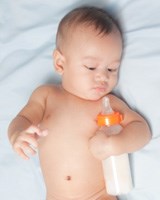The Department of Health has finalised its regulations for the way infant formula milk is promoted, banning images of jolly bottle-fed babies and making it illegal for companies to make negative claims about breastfeeding.
The new laws are intended to stop advertisements extolling the virtues of infant formula and clear the airwaves for the department to get its own message across about the benefits of breastfeeding, which is at a record low in SA. It hopes that by doing so, more women will nurse their babies and reduce their risk of life-threatening illnesses such as diarrhoea and pneumonia.
"Given the country's low exclusive breastfeeding rates of 8% and high infant mortality rates (40 per 1,000 live births), SA needs to put into place a comprehensive legal framework that protects parents and health professionals from aggressive or inappropriate marketing of breastmilk substitutes," said the department's director for nutrition Ann Behr.
"The regulations do not, in any way, compel women to breastfeed against their will (and) do not stop infant formula and complementary foods from being made widely available in retail outlets. They are designed to remove commercial pressures from the infant feeding arena, to ensure that all parents receive independent and objective information and to ensure that all mothers who wish to breastfeed are supported to do so," she said.
New regulations to the Foodstuffs, Cosmetics and Disinfectants Act were published last week, bringing SA in line with the International Code of Marketing of Breastmilk Substitutes and World Health Assembly resolutions.
They include a range of provisions, to be phased in over the next year, that control the words and images that can be used on packaging for formula, bottles, and teats, and complementary foods such as baby cereals.
Fears of HIV transmission and lack of support for new mothers had also contributed to SA's low breastfeeding rates, said Unicef.
Julia O'Grady from the Infant Feeding Association declined to comment on the regulations, saying they had yet to be discussed.
The association represents SA's major baby food and formula manufacturers and counts Aspen Pharmacare, Nestle and Pfizer among its members.
Aspen Pharmacare's head of strategic trade Stavros Nicolaou said Aspen had anticipated the regulations and did not expect any disruption to its business.
Source: Business Day



















































